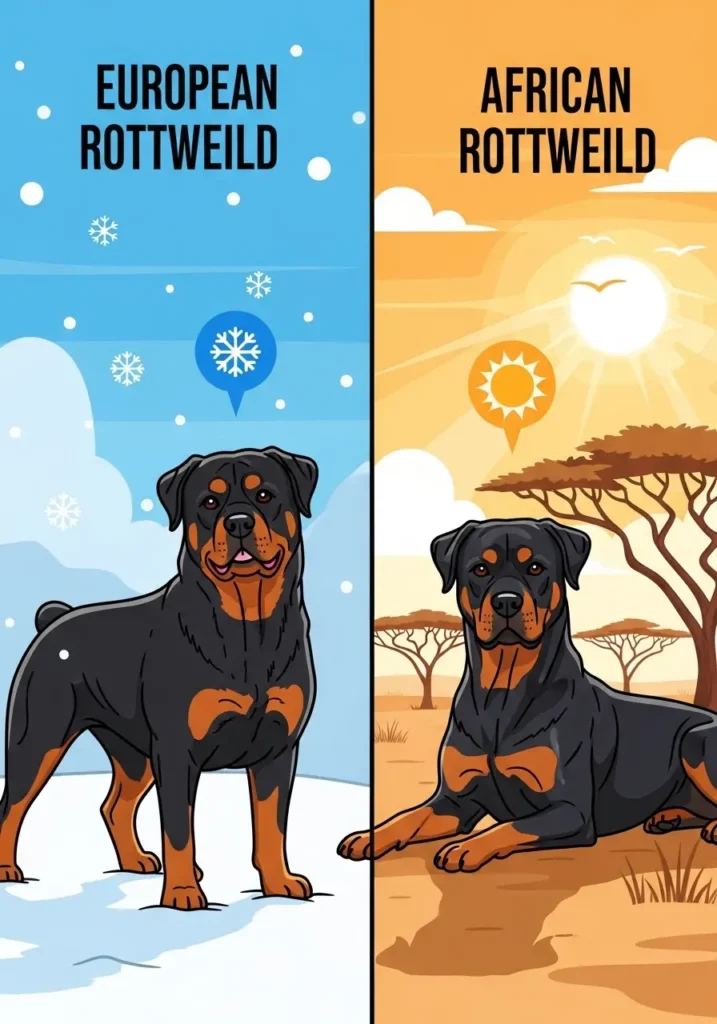When someone mentions Rottweilers, most people instantly picture a massive, muscle-packed guard dog that looks like it could wrestle a bear.
But say “African Rottweiler,” and suddenly, people’s eyebrows go up. Are they some special breed? Bigger? Tougher? Or just sun-loving versions of their European cousins?
Well, grab your coffee because we’re going to unpack exactly what makes African Rottweilers stand out if they do at all.
What Exactly Is An African Rottweiler?
Let’s clear one thing up right away: there’s no separate “African Rottweiler breed.” Rottweilers are Rottweilers—no matter where they live. The breed originated in Germany, where they were used to herd cattle and pull meat carts (yep, the original Uber Eats).
However, African Rottweilers—especially those bred in countries like South Africa, Nigeria, and Kenya—have adapted to very different environments. Think hotter climates, rougher terrain, and, in some cases, less regulated breeding standards.
So, while the DNA is the same, the environment, breeding practices, and diet create some differences in temperament, size, and health.
Physical Differences: Built For The African Climate

Ever noticed how African Rottweilers often look leaner and slightly taller than their European counterparts? That’s not your imagination.
1. Body Type & Size
- European Rottweilers tend to be bulkier, with heavier bone structure and more muscle mass.
- African Rottweilers, on the other hand, often have a leaner, more athletic build. That’s nature’s way of helping them handle Africa’s heat.
It’s the same logic as why marathon runners don’t look like bodybuilders. A lighter frame keeps them cool and agile.
2. Coat & Color
African Rottweilers often have shorter, thinner coats, which makes sense given the weather.
You won’t see many fluffy Rotties basking in 35°C heat—it’s just not practical.
And while their signature black-and-tan markings stay the same, you might notice lighter tan shades due to stronger sun exposure.
3. Head Shape
Some African Rottweilers have a slightly narrower head compared to the thick, blocky heads of German Rottweilers. That’s not a genetic mutation—it’s just how certain bloodlines adapt over generations when bred for agility over show standards.
Temperament: Same Loyalty, Slightly Different Energy

Now let’s talk personality—because if you’ve owned or met a Rottweiler, you know they’re basically a mix of bodyguard and oversized toddler.
So, are African Rottweilers more aggressive or more chill?
1. Environment Shapes Behavior
African Rottweilers are often raised as working dogs or home protectors. They’re taught from a young age to be alert, confident, and a little territorial.
That’s not aggression—it’s purpose.
Meanwhile, Rottweilers in cooler countries are often bred for shows or companionship, so they may have a slightly softer edge.
2. Socialization Plays A Big Role
In many African households, Rotties spend more time outdoors—guarding yards, farms, or properties.
That environment can make them more independent and confident, sometimes even stubborn (sound familiar?).
But give them proper training and love, and they’ll melt into goofy cuddle monsters just like any other Rottie.
3. Intelligence & Obedience
Let’s be real—Rottweilers are smart, no matter where they’re from. African Rotties especially excel at problem-solving and protection work, likely because they’re trained early to think on their feet.
Ever seen a Rottweiler figure out how to open a gate latch? Yeah, they’ll outsmart you if you’re not careful.
Health: What Makes African Rottweilers Unique
Now, here’s where things get interesting (and slightly concerning).
1. Climate Challenges
Hot weather can be rough on a breed that wasn’t originally designed for it. Overheating, dehydration, and skin infections are common issues for African Rottweilers.
Owners need to be extra careful about:
- Providing shade and cool water at all times.
- Avoiding walks during peak heat.
- Feeding balanced diets with enough hydration and electrolytes.
2. Diet Differences
In Africa, many owners use local diets—raw meat, maize meal, or home-cooked stews—rather than imported kibble.
That’s not necessarily bad, but it does affect coat quality, weight, and energy.
A Rottweiler raised on raw diets often develops a shinier coat and leaner muscle tone, but portion control is key to avoiding malnutrition or obesity.
3. Common Health Issues
African Rottweilers, like others, face issues like:
- Hip dysplasia
- Elbow dysplasia
- Bloat (gastric torsion)
- Skin allergies, often worsened by heat and fleas
The difference? Access to veterinary care. In some rural areas, it’s limited, so prevention and regular checkups become even more crucial.
How Long Do Rottweilers Live? (Plus 7 Ways to Help Yours Live Longer)
Breeding Practices: The Good, The Bad, and The “Please Don’t”
Now, let’s address the elephant in the room—or should I say, the “unregistered puppy post” flooding your Facebook feed.
Yep, the rise of backyard breeding in Africa has created both opportunities and risks for the Rottweiler community.
1. Registered vs. Unregistered Breeders
- Registered breeders (like those under KUSA in South Africa) follow strict standards—pedigree checks, health screening, and proper lineage documentation.
- Unregistered breeders, while often well-intentioned, sometimes breed dogs without proper screening, which can lead to genetic issues and unpredictable temperaments.
If you see ads like “Rottweiler puppies, no papers but vaccinated,” take a deep breath and walk away. Or at least do some serious digging first.
2. Why It Matters
Buying from responsible breeders ensures:
- Healthier dogs with verified bloodlines
- Stable temperaments
- Lower risk of inherited diseases
And honestly, supporting ethical breeding helps the entire African Rottweiler community build a better reputation.
3. The Positive Shift
Here’s the good news: awareness is growing fast. More African breeders now proudly register their litters, participate in dog shows, and educate new owners about the importance of responsible breeding.
Progress might be slow, but it’s happening—and it’s exciting to watch.
Training & Lifestyle: African Rottweilers In Action

Ever seen a Rottweiler guard a farm or herd livestock? It’s impressive. These dogs work.
1. Training Styles
African Rotties often undergo early obedience and protection training—not just sit-and-stay, but serious guard work.
They’re taught to identify threats, stay calm under pressure, and respond instantly to commands.
That training builds discipline and loyalty, though it can also make them more cautious around strangers.
2. Family Life
Despite their working roots, African Rottweilers make amazing family dogs when properly socialized. They’re affectionate, gentle with kids, and love being part of family activities.
Just don’t underestimate their energy—they’ll need daily exercise to stay happy. A bored Rottweiler equals chewed furniture. You’ve been warned.
3. Adaptability
What’s cool is how adaptable African Rotties are. Whether it’s an apartment in Johannesburg or a farm in Nairobi, they adjust fast—as long as they get enough exercise, attention, and purpose.
The African Rottweiler Community
If you’ve ever scrolled through a Facebook group like South African Purebred Rottweilers, you’ve probably seen the passion firsthand. Breeders showing off new litters, owners sharing diet tips, people proudly posting their dogs’ photos—it’s a full-on movement.
1. Events & Clubs
Organizations like the Praetor Rottweiler Club in Pretoria host Championship Sieger Shows, where dogs are judged on structure, movement, and temperament.
These events promote ethical breeding and education, helping maintain the breed’s integrity across Africa.
2. Online Communities
Facebook groups, WhatsApp breeder circles, and Instagram pages have become powerful spaces for sharing knowledge and finding trusted breeders.
Just remember to approach every “puppy for sale” post with a bit of skepticism. 😉
So… Are African Rottweilers Really Different?
Short answer: Yes and no.
Yes, because their environment, training, and local breeding practices shape how they look and behave.
No, because at their core, they’re still the same loyal, protective, and intelligent companions we all adore.
The African Rottweiler isn’t a different breed—it’s a different version of the same amazing dog, molded by the continent’s unique conditions.
Final Thoughts: Why We Love Them
Owning a Rottweiler in Africa comes with challenges—heat, health, and training—but the payoff is huge.
They’re devoted protectors, loving companions, and, IMO, some of the most misunderstood dogs out there.
Whether you’ve got a show-quality champion or a rescue Rottie with no papers, one thing stays the same:
Their loyalty runs deep.
So, the next time someone asks if African Rottweilers are different, just smile and say,
“Yeah, they’re different—because they’re ours.” ❤️
Key Takeaways
- African Rottweilers aren’t a separate breed but adapt physically and behaviorally to local environments.
- Hot climates influence their build, coat, and energy levels.
- Proper breeding and care are essential for maintaining health and temperament.
- Ethical breeders and active communities are helping raise the standards across Africa.
- And most importantly, a well-loved Rottie is the same everywhere—fierce, loyal, and totally lovable. 🙂
